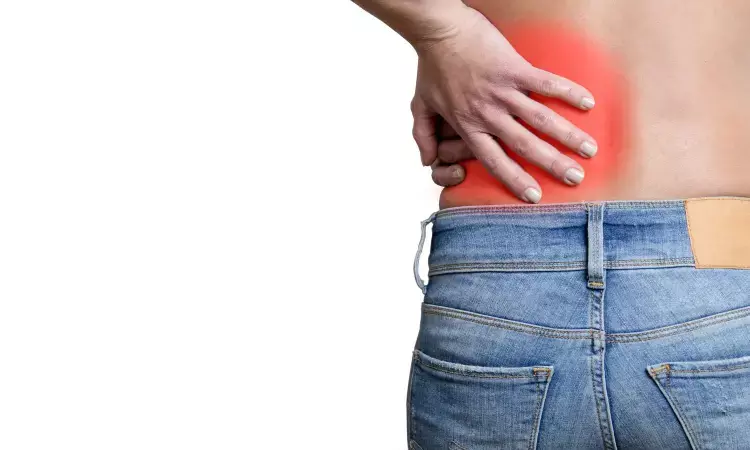- Home
- Medical news & Guidelines
- Anesthesiology
- Cardiology and CTVS
- Critical Care
- Dentistry
- Dermatology
- Diabetes and Endocrinology
- ENT
- Gastroenterology
- Medicine
- Nephrology
- Neurology
- Obstretics-Gynaecology
- Oncology
- Ophthalmology
- Orthopaedics
- Pediatrics-Neonatology
- Psychiatry
- Pulmonology
- Radiology
- Surgery
- Urology
- Laboratory Medicine
- Diet
- Nursing
- Paramedical
- Physiotherapy
- Health news
- Fact Check
- Bone Health Fact Check
- Brain Health Fact Check
- Cancer Related Fact Check
- Child Care Fact Check
- Dental and oral health fact check
- Diabetes and metabolic health fact check
- Diet and Nutrition Fact Check
- Eye and ENT Care Fact Check
- Fitness fact check
- Gut health fact check
- Heart health fact check
- Kidney health fact check
- Medical education fact check
- Men's health fact check
- Respiratory fact check
- Skin and hair care fact check
- Vaccine and Immunization fact check
- Women's health fact check
- AYUSH
- State News
- Andaman and Nicobar Islands
- Andhra Pradesh
- Arunachal Pradesh
- Assam
- Bihar
- Chandigarh
- Chattisgarh
- Dadra and Nagar Haveli
- Daman and Diu
- Delhi
- Goa
- Gujarat
- Haryana
- Himachal Pradesh
- Jammu & Kashmir
- Jharkhand
- Karnataka
- Kerala
- Ladakh
- Lakshadweep
- Madhya Pradesh
- Maharashtra
- Manipur
- Meghalaya
- Mizoram
- Nagaland
- Odisha
- Puducherry
- Punjab
- Rajasthan
- Sikkim
- Tamil Nadu
- Telangana
- Tripura
- Uttar Pradesh
- Uttrakhand
- West Bengal
- Medical Education
- Industry
Kidney stone surgery without radiation safe when performed by experienced urologists

A study published in European Urology Focus has concluded that procedures like fluoroscopy-free ureteroscopic and percutaneous nephrolithotomy (PCNL) have comparable stone-free rates or SFRs and complication rates to the corresponding fluoroscopic procedures. The researchers said that fluoroscopy-free and fluoroscopic endourological procedures are comparable pertaining to the duration of operation, Length of stay, and the incidence of auxiliary procedures for stone clearance. These findings are essential both for clinicians and patients, they explained.
This study, "Comparison of Treatment Outcomes for Fluoroscopic and Fluoroscopy-free Endourological Procedures: A Systematic Review on Behalf of the European Association of Urology Urolithiasis Guidelines Panel", is researched by Davis et al. and colleagues.
Endourological procedures require fluoroscopic guidance. This causes harmful radiation exposure to patients and staff. One clinician-controlled method to decrease this exposure in urolithiasis patients is to avoid using intraoperative fluoroscopy during stone intervention procedures.
Considering this background, researchers assessed the benefits and risks of "fluoroscopy-free" and fluoroscopic endourological interventions in such patients by performing systematic reviews using databases like MEDLINE/PubMed, Embase, and Cochrane.
SFR and complications were the primary outcomes, while secondary were:
- Operative duration.
- Hospital length of stay.
- Conversion from a fluoroscopy-free to a fluoroscopic procedure.
- Additional procedure requirement.
The key results of the study are:
- A total of 24 studies were eligible for analysis.
- A total of 4564 patients were with urolithiasis.
- 2309 underwent a fluoroscopy-free procedure.
- 2255 underwent a comparative fluoroscopic procedure for managing urolithiasis.
- There was no reported difference between the groups in SFR, operative duration or LOS.
- The fluoroscopy group had higher rates of complications.
- The incidence of conversion from a fluoroscopy-free to a fluoroscopic procedure was 2.84%.
- They observed similarities in results in subanalyses for ureteroscopy and PCNL.
- Analysing only randomised studies, the fluoroscopy group's overall complication rate was significant.
In this study, researchers compared treatments for kidney stones with/ without radiation use.
Conclusion Further, fluoroscopy-free and fluoroscopic endourological procedures have comparable stone-free and complication rates under the supervision of experienced urologists.
Based on the findings of our study, we found a low conversion rate from a fluoroscopy-free to a fluoroscopic endourological procedure, they wrote.
One of the essential highlights of this study is that the investigative findings are important from the perspective of both patients because the detrimental health effects of ionising radiation are preventable/avoidable during surgery for kidney stones.
Further reading:
https://www.sciencedirect.com/science/article/abs/pii/S2405456923001190
BDS, MDS in Periodontics and Implantology
Dr. Aditi Yadav is a BDS, MDS in Periodontics and Implantology. She has a clinical experience of 5 years as a laser dental surgeon. She also has a Diploma in clinical research and pharmacovigilance and is a Certified data scientist. She is currently working as a content developer in e-health services. Dr. Yadav has a keen interest in Medical Journalism and is actively involved in Medical Research writing.
Dr Kamal Kant Kohli-MBBS, DTCD- a chest specialist with more than 30 years of practice and a flair for writing clinical articles, Dr Kamal Kant Kohli joined Medical Dialogues as a Chief Editor of Medical News. Besides writing articles, as an editor, he proofreads and verifies all the medical content published on Medical Dialogues including those coming from journals, studies,medical conferences,guidelines etc. Email: drkohli@medicaldialogues.in. Contact no. 011-43720751


